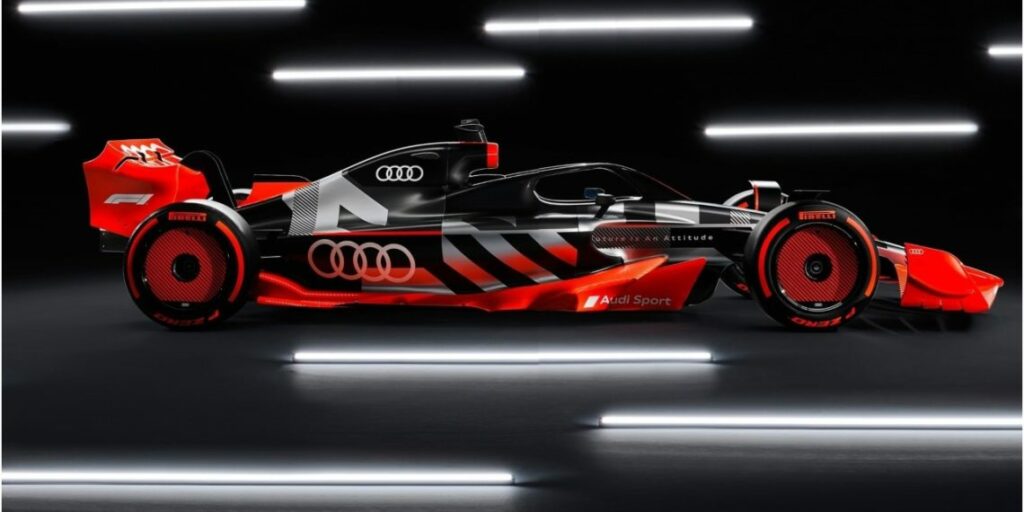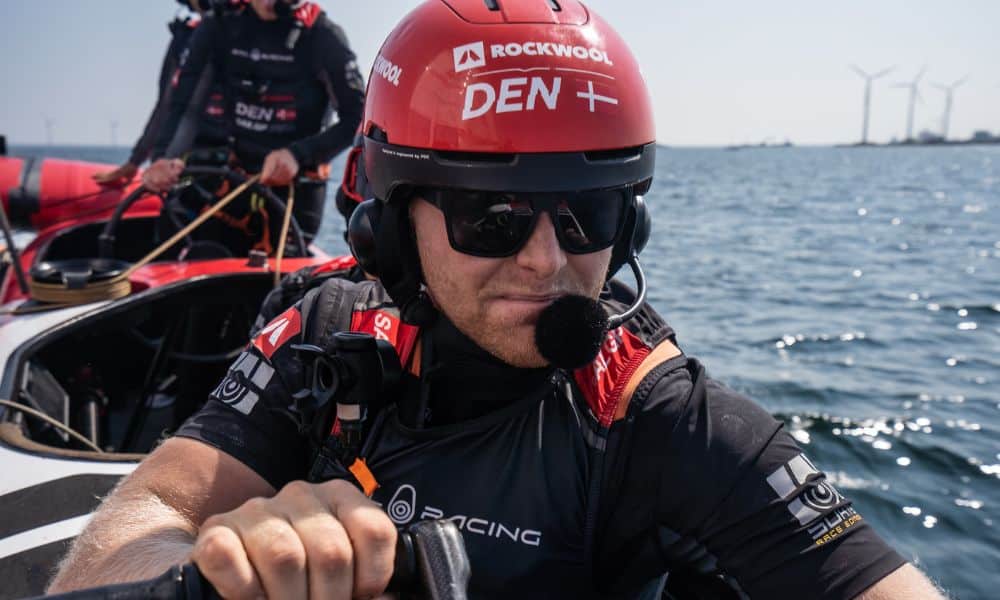This week in the Sustainable Motorsport Roundup I have a number of cool developments for you in the world of sustainable motorsport and beyond. I cover everything from the impact of Audi’s arrival in Formula 1 and what it means for their sustainability push to a very cool all-electric track car from Vietnam. All this plus some tips on sustainable travel in Every Little Bit Counts to some interesting developments in the world of sustainable transportation. Enjoy!
Sustainable Motorsport News
- In Blackbook Motorsport’s latest report Driving value: The business of motorsport sponsorship in 2022, Shell explains how they are working with their partners on a Path to Net Zero. “Its reach into multiple spheres of motorsport places Shell in the best position to realise its future ambitions: most notably, the path to decarbonisation. This can be achieved in two ways – by displaying its technical expertise through its partnerships, or by raising greater awareness through its initiatives.”
- iRacing has announced that the Porsche Mission R will become the first electric car to debut on iRacing in the 2022 Season 4 build. “Electrification comes to iRacing for the first time with 2022 Season 4, as iRacing and Porsche have teamed up to bring the Porsche Mission R concept car to the world’s premier motorsport simulator with next week’s build. The car will be available for purchase by all iRacing users immediately upon the release of the new build, and will be playable in public, hosted, league, time trial, and test drive modes.”
Sustainable Motorsport Tech
- Audi has revealed the Audi RS Q e-tron E, their updated electric Dakar challenger for 2023 which they describe as being lighter, more aerodynamic and even more efficient. According to Autosport, “Audi has significantly overhauled its Dakar Rally prototype for 2023, with the upgrades aimed at improving efficiency of the powertrain and making the car easier to operate for the crew.”
- MotorTrend looks at the 2026 electric successor to the 918 Spyder hybrid. “Expect this unnamed model to feature electric power exclusively. Otherwise, Stuttgart could have fit it with, say, a plug-in hybrid roadgoing version of the turbocharged 1.6-liter V-6 it developed quietly toward the end of the previous decade for a possible Formula 1 program it ultimately binned.”

- The Robb Report looks at the new 536 HP Bandit9 electric track car. “We wanted to make a car that recreated the experience of riding a motorcycle,” Bandit9 boss Daryl Villanueva told Robb Report in an exclusive interview. His Ho Chi Minh City-based company struck a chord with ultra-sleek custom motorcycles that more closely resemble highly polished bullets than bikes. Villanueva says he’s ready to translate that two-wheeled philosophy to the automotive realm. “There are already a number of open-top vehicles that try to simulate the feeling of freedom and connection to the environment, but sadly fall short,” he tells Robb Report. “The answer, in my opinion, is not in the design but in its philosophy. A motorcycle forces you to focus. Like meditation, it’s not about zoning out. It’s about zoning in. When you’re riding, your mind and body are attuned to the present because it demands all your attention.”
Series News
- Green Racing News looks at how Audi’s arrival in Formula 1 will boost its sustainability while Sustainability Magazine looks at how the series repositioning towards sustainability can rewrite the formula. “Even in sports with an unsustainable image like Formula One, it’s evident that paradigms are changing. The 2026 regulations, shifting the sport further along the sustainable spectrum, has unlocked doors to fruitful new partnerships and frontiers. F1 can continue thriving in a manner that preserves the planet for future generations, while Volkswagen can meet their wider corporate goals by entering the sport.”
- It has been officially confirmed that Formula 2 and Formula 3 are set to partner with Aramco to pioneer sustainable fuels from 2023 to help reach Formula 1’s overall sustainability targets for 2026 and beyond. Bruno Michel, CEO of F2 and F3, said: “Sustainability is a top priority in today’s world, and we have been working on making our sport more sustainable for some time now. The goal to switch to synthetic fuel can only be achieved through the partnership with a company of the scale of Aramco, which is determined to produce advanced sustainable fuel in the near future. It’s easier to implement such a significant change in F2 and in F3, as they are single-make categories with single suppliers. We’re very happy to undertake an innovation role – as we did last season with the introduction of the 18-inch tyres now used in F1 – and take the first steps towards synthetic sustainable fuel.”
 How Formula E Has Made Motorsport Sustainable
How Formula E Has Made Motorsport Sustainable - Speaking of Formula E, Sebastian Vettel has been accused of greenwashing by Lucas di Grassi after Vettel criticized the series. Quite frankly, this is petty. Let’s leave the term “greenwashing” for when it truly applies, for those who don’t walk the talk. Criticizing Formula E, or any sustainable motorsport initiative for that matter is part of the give and take that is part and parcel of the process while we all figure this out. Instead of accusing someone of greenwashing, maybe reach out to answer any constructive criticism with facts and figures, or choose to agree to disagree. UPDATE: Di Grassi doubles down on his criticism of Vettel. My suggestion is that he reaches out to him directly and not through the media if he wants this to be a constructive dialog.
Every Little Bit Counts
Every Little Bit Counts looks at small steps that you can take to decrease your environmental impact and increase your sustainability.
- Green Baggage looks at five ways to make air travel more sustainable. “International air traffic accounts for around 2.5% of total carbon emissions globally. With air traffic volume set to rise globally over the next 10 years, it’s important that the aviation industry mitigates its climate impacts. In fact, air travel is the first industry with a global emission management system that seeks to guarantee that international air traffic emissions will not increase after 2020, even if passenger numbers do. The aim is to halve emissions by 2050, relative to 2005 levels. But what can individual passengers do to counteract climate effects when they choose to fly?“
- Sustainable Travel International has an online tool that allows you to calculate your travel carbon footprint. “Climate-friendly travel is now more important than ever. That’s why we completely redesigned our carbon calculator to offer an entirely new carbon offsetting experience. It’s never been easier to green your travels and contribute to global climate action.”
 Interview: Bruno Senna – “I want to reduce my overall footprint on the world”
Interview: Bruno Senna – “I want to reduce my overall footprint on the world” The Big Picture
In The Big Picture, I look beyond motorsport to see what other sports are doing in their sustainability journey as well as the issue of sustainability generally.

- In Racing to a sustainable future in the world of sport, Sustainability Magazine looks at how things like the Olympics are dealing with the sustainability challenge.
- From the construction of venues to the travel of competitors and spectators, major sporting events inevitably have a significant impact on the environment. Event organisers therefore have a critical role to play in creating a sustainable culture around sporting competitions and spectatorship, based on five key sustainability themes:
- Climate change
- Resource management
- Natural environment and biodiversity
- Human rights, labour and fair business practices
- Involvement, cooperation, and communications
- From the construction of venues to the travel of competitors and spectators, major sporting events inevitably have a significant impact on the environment. Event organisers therefore have a critical role to play in creating a sustainable culture around sporting competitions and spectatorship, based on five key sustainability themes:
- El Pais explains how Major League Baseball is quite serious about fighting climate change. “Despite having a very active competition calendar, MLB had registered a drop in emissions of around 22%, in contrast to the 15% of the NBA or the meager 6% of the NFL. In light of these data, Sammy Roth, an expert on energy and the environment at the Los Angeles Times, commented in an article that consolidating the positive change that occurred as a result of exceptional circumstances would be very desirable. Roth found it disheartening to witness a final stretch of the 2019-2020 season with empty stadiums and a predominance of home games; however, in his opinion, a balanced middle ground, with around 10 less days in the regular season and a certain moderation of the trips, would reduce emissions by a very significant 11%.”
- Sports Pro Media looks at how SailGP’s Denmark Grand Prix is setting the standard for sustainable sporting events. “In line with the slogan ‘powered by nature’, the Grand Prix tech site in Nordhavn is fully generated by wind power, meaning the F50 racing boats’ batteries were also completely charged using renewable energy. From plant-based food options and fully recyclable cutlery, to Carlsberg’s newly designed plastic beer bottles and electric buses taking fans to the venue, every detail of the Denmark Sail Grand Prix appeared to be geared towards reducing the event’s carbon footprint.”
- Blockchain, NFTs and cryptocurrency have been discussed here on Racers Racers Can Use in numerous posts (such as here, here and here) but there has always been an underlying unease on the environmental footprint of the technology. The Guardian looks at how cryptocurrency ethereum plans to cut carbon emissions by 99% with upgrade. “The project, called “the merge”, will result in ethereum switching the underlying technology it uses for validating crypto transactions to a new process that requires less energy to manage.”
Getting to the Track Sustainably

Getting to the Track Sustainably is my occasional column on developments in sustainable transportation that could have some application to motorsport. Since the majority of carbon emissions come from logistics and transportation, this topic is of utmost importance as motorsport works to make itself more sustainable. Here are some articles you may find of interest.
- Green hydrogen: the key to decarbonizing industry?
- Salesforce Announces New Partnership With JetBlue For Sustainable Aviation
- 3 ways we can keep flying with zero-carbon emissions
- Airbus and CFM to test hydrogen-powered engine on an A380
- Virgin Atlantic buys SAF from Neste while Virgin Group enters plastic waste to fuel venture

- Sikorsky helicopter successfully uses SAF during flight
- Hydrogen-powered aircraft could contribute strongly to aviation’s 2050 goals, finds ICCT study
- REG and Bunker Holding advance biodiesel use in US and EU marine markets
- Nano diamond batteries could last thousands of years
- Iberia partners with energy group Cepsa to develop sustainable fuels for aircraft and ground fleets
- ASCO ditches diesel for HVO to cut carbon emissions by almost 50%
- Beyond Li-ion batteries: performance, materials diversification, and sustainability




